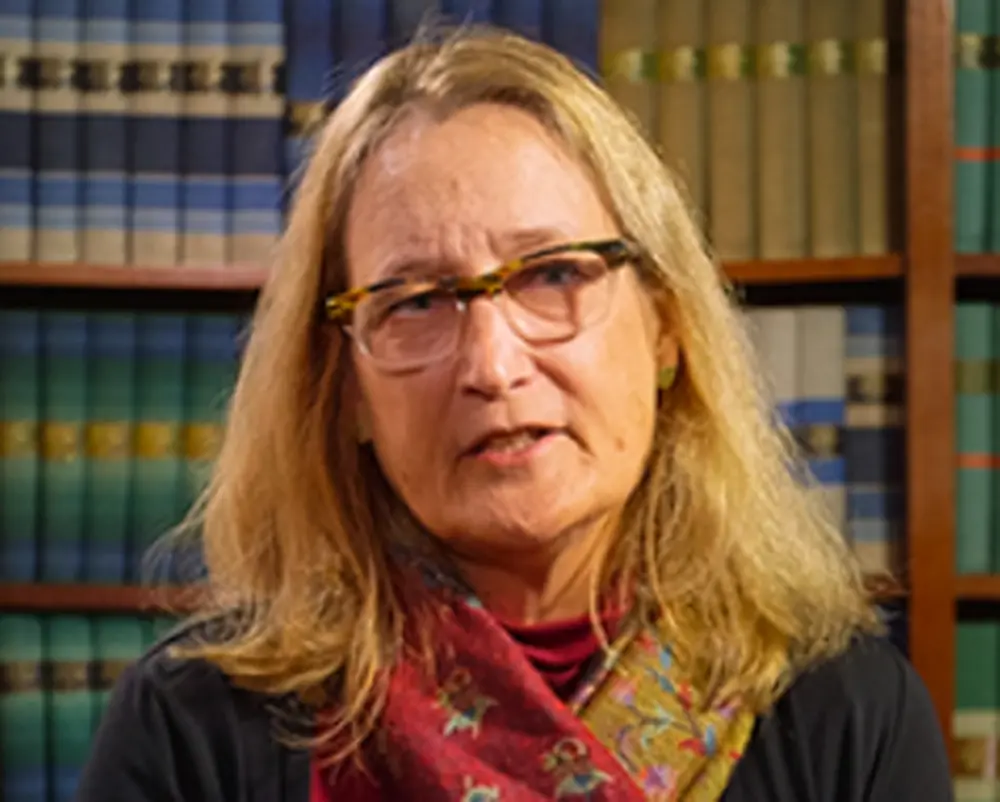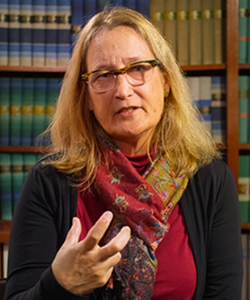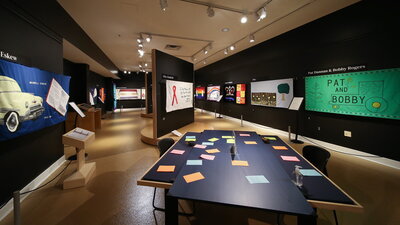

In the Department of History, a new award will provide opportunities for undergraduate students to gain hands-on research experience in the community.
The Kathryn Oberdeck Public History Award Fund will honor the dedication to public history, community engagement, and social justice work of history professor Kathryn Oberdeck, who passed away in 2022. The fund will support undergraduates who are undertaking public history and/or community engagement projects like an internship, honors research paper, or independent research project. The award is generously supported by her husband William Munro and daughters Fiona Munro and Cara Munro.
“Throughout her 40 plus years in the realm of higher education, Kathy was compelled by the quotidian histories of community life in which she also engaged. If history is the laboratory of human experience, communities were the laboratory in which she liked to work,” William Munro said in a speech announcing the award at the 2025 Department of History Award Ceremony.
Oberdeck was a pioneer in public history at the University of Illinois whose commitment to collaborative and inclusive community-focused scholarship was reflected throughout her entire academic career. Shortly before she died in 2022, Oberdeck received the Campus Excellence in Public Engagement award, which honored her work to connect students and the community with the history of Champaign-Urbana.
“She was doing what she loved. She engaged in rigorous local community-based histories. Getting communities to recover their histories, getting students into the community, and getting students to reflect on that. And I think she was really good at it,” said Munro.
Munro described Oberdeck as an “extraordinarily meticulous and creative historian with a deep-seated commitment to social justice.” Qualities which he said drew students to her. “She loved working with students and mentoring students at the graduate and undergraduate level.”
Alumnus Brian Ingrassia (PhD, ’08, history), a professor at West Texas A&M University, remembers working with Oberdeck while he was a graduate student.
“Kathy Oberdeck truly was one of the most brilliant and intellectually curious people I've ever met, and she worked tirelessly to instill in her students a similar level of intellectual curiosity. She had an incredible talent for taking ostensibly local topics and broadening them out into stories of larger significance,” said Ingrassia. “Kathy was a wonderful mentor, and her teaching shaped the lives and intellectual trajectories of so many students at the University of Illinois.”
In the Department of History, she passed on her commitment to community-focused scholarship to her students. She brought History Harvest, a collaborative public history project originally developed by the University of Nebraska, Lincoln, to Illinois, to create opportunities for undergraduates to gain hands-on research experience.
History Harvest brings students and community members together to collect and digitize documents and artifacts of historical interest for scholarly and community research. One History Harvest project created digital archives of the local drag community and of AIDS activism. The project culminated in a community-curated exhibit, Sewn in Memory: AIDS Quilt Panels from Central Illinois, at Spurlock Museum.

Oberdeck also co-directed the Public History and Student Research Cluster at the Humanities Research Institute with professor Daniel Gilbert. The group brought together faculty, students, archivists and librarians, community activists and community members to create Hidden Histories Tours that highlighted activism and resistance on campus and in Champaign-Urbana.
Munro said he would like to see the award support a similar type of public history that involves collaborative and inclusive engagement with community members. The award was designed to facilitate a student’s work in a community and create an opportunity for a significant research experience.
“We wanted to have community engagement or a community partner and we wanted to have it be mentored by a faculty member. So the faculty member is there to make sure they do good history, the community is there to get the public engagement, and the research experience is to be a good historian,” he said.
In his speech announcing the award, he recited a quote from Oberdeck herself that summed up his hopes.
“The aim is ‘to facilitate opportunities for students to engage with community history projects as well as collaborative campus units involved in public history and community institutions and organizations to foster the exploration, discussion, exhibition and production of history for, by and about diverse publics.”
In his own work as a professor at Illinois Wesleyan, Munro said he has found that “the potential of funding does wonders for our students’ intellectual imagination,” and he hopes that the award will be similarly generative for students at Illinois.
The award will be given to a student for the first time in 2026.
If you would like to support the Kathryn Oberdeck Public History Award Fund, you may make a contribution here.